● 倪乐雄
在中美“撞机事件”发生后,人们国际局势谈论得较多的话题是:“中美之间会爆发战争吗?”“中美战争何时爆发?”“中美之间将爆发何种规模的战争?”这些问题都难以回答,不过有一点确是明白无疑,中美之间存在着深深的敌意。本文将着重分析这一敌意的根源、结构、背景、性质、现状以及可能的发展趋势。
从表面上看,也就是大多数国际问题专家认为的那样,台湾问题似乎是中美产生敌意的主要根源,但从深远的历史角度和历史经验来看,台湾问题只是中美冲突表面的聚焦点之一。中美之间的敌意根源于两个因素,一是意识形态的对立;二是正在崛起的强国与现存强国的对立。这两种对立都属水火不相容的性质、并且具有相互诱导的特点。前者发展至极端,可导致西方历史上的十字军东征、伊斯兰的一手执古兰经一手执剑、大革命后的法国同七次反法联盟的对抗、1共产主义世界与资本主义世界的对抗;关于后者,局限于短时段的考察是难以作出正确判断的,需在长时段里寻找规律或加以研判,即应从以往的历史中考察这种类型的冲突的一般规律和模式,可能会给我们以相当的启示。比如古希腊提洛同盟与伯罗奔尼撒同盟的对峙、迦太基与罗马的冲突、奥斯曼土耳其同威尼斯的交锋、2西班牙与英国的抗衡、3普鲁士同法兰西的对抗、4英国同德国及美国与日本的对抗等等。以往历史表明,国与国之间的关系只要符合上述一种,敌意和冲突就很难化解。不幸的是,这两种势同水火、互相诱导的对立都被中美关系所包括。5
中美之间的敌意能否化解?中美两国能否摆脱历史的宿命而避免未来的冲突?考察曾经有过的中美“蜜月”现象,或许有助于认清这一问题。中美之间有过两次“蜜月”,抗日战争和前苏联扩张时期,通过对两次“蜜月”的分析,不难总结出中美交往的一般规律,当中美面临共同敌人威胁,且单凭各自的力量又不足以与之抗衡时,中美两国才会放弃敌意,变得友好甚至结盟。另一个典型例子是一战前的英法关系,法国和英国战前曾非常对立,差点动武,由于德国咄咄逼人的势头成为英法共同的威胁,两国在共同敌人的压力下,一揽子解决了他们之间的分歧,终于化敌为友。若要恢复中美“蜜月”,除非目前出现某个国家或某种新的因素,替代前苏联的角色,对中美再次形成共同威胁。所以,最需要做得是寻找共同的敌人和共同的威胁。然而,举目四望,目前国际社会中,哪些国家和哪些因素能够共同威胁中美两国呢?贸易、印度的核武器发展计划、国际恐怖主义、伊斯兰极端主义等等,都远远不足于取代前苏联而构成两国共同的、严重的威胁。也许有人问?大路朝天,各走半边。中美即不结盟也不对立,相安无事可以吗?很难!在本质上被“丛林原则”所支配的国际社会中,由于中美之间敌意的两个主要根源目前无消除之迹象,因此中美关系友好和敌意很像冬季里冷暖空气的锋面,总是贴在一起,中间没有过渡地带。除非出现一个共同的敌人或共同的威胁,足以抵消中美之间两种致命的对立,遗憾的是,目前这一共同的敌人或共同的威胁并不存在,今后是否出现也不得而知。
从对抗到友好还有一个重要的标志,就是一揽子解决国与国之间存在的重大分歧。6中美之间敌意的化解和冲突的避免需要一揽子解决他们之间存在的问题,目前则缺乏一揽子解决问题的原动力。而这些问题上产生的不信任、磨擦、对抗则反过来不断地加深敌意,在理性层面相互把对方看成是真正的敌人。
那么,经济互补、渗透能否消除敌意、避免冲突呢?有人认为只要加强贸易来往,造成中美经济结构你中有我、我中有你相互依赖的局面,两国和平共处就有了保证。中美两国决策层里亦有不少人持这种观点,然而,这种想法并非绝对可靠,得视具体情况而论。第一次世界大战前英国和德国的经济往来也很密切,按照俄国学者乌特金的说法“当时相互依赖确实达到了令人难忘的规模”,据此欧洲到处弥漫着乐观主义情绪,有人甚至断言“人类已经重返伊甸园”,还有什么理由要打仗?然而,随后发生的两次世界大战将“贸易消除战争”的看法击得粉碎。C?沃尔茨、M?艾尔曼、M?布朗等专家认为“如果国际社会的成员彼此感到恐惧,相互依赖只会增加冲突的可能性。”7第一次世界大战以前,一位英国人曾经考虑到英德之间非常频繁的商品交换,但一看到德国工厂冒烟的烟囱时却说:“这些烟囱每一个都是指向英国的炮口。”两次世界大战表明:相互依赖的经济关系似乎并不能消除深深的敌意,从而避免战争。
但是,也有相反的例子。阿尔萨斯-洛林地区的归属问题,曾是德国和法国不共戴天和卷入两次世界大战的主要原因。战后欧洲经济共同体导致了政治上的合作,乃至发展到今天欧盟的出现,经过半个多世纪经济协作、和源于经济协作的政治合作,德、法恐怕再也不会为阿尔萨斯--洛林地区的归属打仗了。
通过对上述两种相反情形的考察,可以发现经济互补与战争冲突存在着两种模式,一是经济互补不能消除战争,二是经济互补能够消除战争。深究下去,其中的关键取决于相互依赖的程度。如果建立一个理论模型的话,其中必有一个决定性的临界点,经济相互依赖程度达不到这一临界点,则不足以消除敌意和避免战争,反而将这种相互依赖关系变成相互报复的资源,徒增一个新的引爆点,从而加剧了冲突的激烈程度;8经济相互依赖的程度达到并越过这一临界点,则可消除敌意阻止战争。假如笔者这一从历史经验里提炼出来的“经济互补——战争冲突”的理论模式能够成立,那么,现在的问题是:中美经济相互依赖的程度是否已经达到了这一临界点?现实的情况是远没有到达这一临界点,因而“贸易消除敌意和冲突”的模式至少不适用于现在乃至未来相当长一段时期的中美关系。9
“经济互补——战争冲突”理论模型
现在一般都认为台湾问题是中美关系最主要、最关键的问题,但若进一步问:“美国为何采取现行的对台政策?”其答必曰:“出于美国要长期遏制中国的战略考虑。”若再连续追问:“为什么美国选择这种战略?”“这种战略决策背后深藏的动机、心理、思维方式又是怎样一种状态?”这就涉及到较为深层的实质性问题。
我以为在一个相当长的时间内,困扰中美两国最大的实质性问题是:双方都不知道对方将来要干什么。这是一个让双方都不知所措的问题。因为国际关系包括两重性质的互动,一是双方或几方的互动,二是现在与将来的互动。美国不知对方将要干什么,也就不知道自己现在应该干什么。中国不知道美国将来如何对待自己,因而对今天的举措是否正确心里也没有底,例如,对台湾动武与否,早打还是晚打都举棋不定。其中关键问题是未来中国走向不明,相反,美国的意图很明显,要保持一家独霸地位。笔者于去年同美国的军事外交专家进行广泛的交流,在同国务院、国防部、国防大学、陆军战争学院、西点、哈佛、普林斯顿、麻省、太总部的坦率交流中,美方专家共同的特征是对中国未来走向不明,尤其在太平洋战区总部,几位中国问题专家连续追问:“中国将来到底要干什么?”10为弄清未来崛起的中国是否会挑战美国的霸权,美国国内开始重视中国传统的战略文化研究,想从中国古代传统里获得有价值的信息,但至今没有结论。现在的困难在于:中国将来如何对待美国要根据美国将来如何对待中国来确定,而美国将来如何对待中国又需根据中国将来如何对待美国来确定,由于中国未来强大后走向不明(也不可能明了),所以,中美关系今后的短期互动虽呈现表面的逻辑性,但长远互动在本质上处于盲目状态。
中国未来走向不明,不仅导致两国关系长远互动陷于盲目性,也必然给美国带来两种困惑甚至恐惧,一种是未来中国可能威胁自己,由于现在没有加以遏制,最后被动地卷入的冲突;11另一种是本来中国不会同自己发生冲突,但因错误判断中国而采取强硬措施,最终“弄假成真”,导致了将来与中国的冲突。由于中国未来走向事实上不可能有答案,美国将在较长的时间里无法摆脱这两种恐惧。以克林顿为代表的自由主义战略思维和以小布什为代表的现实主义战略思维共存于美国,交替影响美国对华政策,其根本原因是美国无法准确判断中国未来走向、中美关系互动的盲目性以及由此产生的两种恐惧所致。可以预见,美国对华政策将长期徘徊于鸽派和鹰派之间而不得要领。
现实情形就是如此,一个国家无论政治、军事、外交需要预设将来的目标,以便于引导当前的行动,更加东欧发生巨变,美国一时陷于没有对手困境,对于正在迅猛崛起、向现代化作强行军的中国未来走向,美国需要答案,否则目前就无法行动。12但是,这个问题今天不可能有答案。任何国家都无法预料自己将来的命运,因为国家受到国际社会互动的制约。另外,任何国家先前预设的目标、或对世界的承诺等等,都属一代人的主观愿望而已,不能代替第三、四代人想法。没有答案美国无法行动,怎么办?根据人类一般行为规律,在充满敌意的国际社会中,美国现时遵循两种基本的思维途径采取行动,一,以自身文明传统的行为方式为基础,来理解中国追求富强的企图和目的;二,以“绝对保险”的思路筹划未来,并规定今天的任务和采取行动。
细而言之,美国和西方世界从骨子里不相信“中国将来强大了也决不称霸”的承诺。这跟他们的几千年文明传统有极大关系,从古希腊以来,富裕生活和商业贸易、海外殖民、军事扩张、争夺制海权(今天已发展用制空权来完成对制海权的争夺)、强权称霸在欧洲文明史的发展过程中是密不可分的,强大与称霸可以说是同义语。由这种文明传统培育出来的人们,觉得强大而不称霸是不可思议的。东方农耕文明由于其特有的生存方式,财富源于土地耕耘而非开拓海外市场,生存与发展不必与海上贸易、制海权、军事扩张挂钩,使得强大和称霸并不构成必然的关系。中国古代历史基本上可以证明这点。简而言之,西方文明的逻辑是“强大必然称霸”,中华文明的逻辑是“强大未必称霸”。但由西方传统孵化出来的美国在理解东方文明这一特点上存在着难以逾越的障碍,这是中美两国打交道时深层的、潜意识层次里的冲突,也可看作“文明的冲突”。既然强大必然意味着称霸,那就必须遏制,所以美国对中国的基本判断及采取遏制政策的根源,归根结底来自欧洲文明传统和欧洲的历史经验。13
既然作出这样的判断,必要的保险措施就得跟进,美国必须在时间上和空间上立于不败之地,必须在时间上和空间上最大限度地阻止中国的强大。三个例子可以说明问题:
在台湾问题上,美国将会最大限度地利用台湾问题作为遏制中国崛起的砝码,这点今后任何一届美国政府,不管对华强硬派还是缓和派都不会含糊。小布什政府公开声言将不惜任何代价协防台湾,克林顿政府也一样,只不过用另一种语言表达了同一个意思,即在1996年当解放军举行演习时派遣两支航母编队前往台湾海峡。另一方面,美国不支持“台独”而坚持“一个中国”的原则,同时反对武力解决台湾问题,这暴露出美国的另一种心态:即想最大限度地把台湾作为遏制中国崛起的长远战略筹码,又不愿为此付过多的代价。而美国至今的困惑是:不清楚台湾作为战略筹码在遏制中国时份量到底有多大,因此也弄不清楚自己所付代价的限度在哪儿。14
在中国加入WTO问题上,美国支持中国加入WTO组织也是出于“绝对保险”的思路。美国相信:经济生活、经济结构的变化最终要导致政治体制和意识形态的变化,15将中国未来发展纳入美国理想的预设轨道不是不可能的事。另外,一个传统农业社会直接向工业社会或后工业社会的转型将面临巨大困难,加入WTO的中国社会因原本存在的各种社会矛盾,可能会产生剧烈“阵痛”,一旦转型失败,中国将陷于畸形发展的泥潭而成为一个长期“废人”。这样的先例在第三世界国家中比比皆是。所以,中国加入WTO在美国看来有利而无害,转型成功则纳入美国预想之发展轨道,不成功则在“阵痛”中陷于内乱成为残废,不再是美国的对手。这既符合美国根本利益,又其中暗藏杀机,所谓“一石二鸟”也。所以克林顿政府和小布什政府都“支持”中国入世。
另一个保险措施是建立国家导弹防御体系。建立导弹防御体系对美国国家战略来说既是全球性的,也是地区性的,包括三个层面上的利益:第一,美国将在相当程度上摆脱“确保相互摧毁”状况下,同对手互为核人质的地位,而处于对手单方面成为自己的核人质的有利、有力地位。并有可能使全世界有核、无核国家都单方面成为自己的核人质的绝对霸权地位。第二、可彻底摆脱了所谓“无赖国家”利用核武器“四两拨千斤”的威胁。第三,导弹防御体系是遏制中国的一张大牌,如果中国参加军备竞赛,可能像前苏联一样被拖垮。如果不进行军备竞赛,则中国只能接受单方面成为美国核人质的不利地位。因此,建立导弹防御体系对美国国家利益而言,正所谓“一石三鸟”,有百利而无一害,美国迟早是要搞的。16
在充满敌意的环境里,在对方敌友模糊的情况下,宁可把对手当作敌人,也不可认作朋友,这固然保险安全,小布什政府遵循“绝对保险”的思路为美国对华关系策划着将来,且比克林顿政府更趋极端,但是,如前所述,中国未来走向对美国来说是没有真实答案的,“绝对保险”措施是建立在“虚拟”的答案或前提上的,即“中国将来肯定会威胁美国”仅仅是一种虚拟假设,将一个国家根本战略和社会资源动员建立在虚拟性质的基础上,其不明智、弄险的性质是不言而喻的。可以肯定,任何一届美国政府、包括小布什政府,如果把对华政策建立在这一“虚拟”前提上,内心都是不踏实的、都会激起国内另一派战略思维的强烈反对,因而也可预料任何对华过分强硬的政策是不会长久的。因为还存在着另一种可能,如果中国未来根本不会对美国产生威胁,倒是“虚拟假设”为基础的对华政策造就了未来中美冲突,岂不自讨苦吃?所以,美国任何一届政府即使采取对华强硬政策,也不得不考虑分寸的把握。17
但上述分析都属于现时状况的分析,不能代替历史分析,而且现实最终服从于未来,从历史纵向看,对于想永远保持一强凌天下的美国来说,任何一个正在崛起的国家都将自动地成为它的未来假想敌。展望前景,中美双方的感觉都极差。回到前面的问题,根据历史经验,既然中美敌意的根源由两种水火不相容矛盾构成,一时又无法化解,那么中美关系就可能出现两种前景,一是敌意将完全按自身的逻辑毫无抑制地展开,台湾问题、西藏问题、驻南使馆被炸、撞机事件、法轮功等等,都会加深、加速敌意的积累,历史一再表明,如果两个国家的敌意是建立在不可调和的矛盾基础之上,那么这种敌意在经过一定时间和事件的积累后,必定趋向于极端而到达其质变终点,重大的战争冲突的发生是迟早的事情,战争酝酿期间会有缓和的因素出现,但仅仅起到拖延的作用,但酝酿的方向始终不变,除非出现某种因素能够消除敌意的根源。
现代历史一个典型的例子是第一次世界大战爆发前的奥匈帝国皇太子斐迪南被刺事件,最初谁也没想到他的被刺居然会引发大战爆发。据现有文献表明,当时欧洲主要国家的领导人从内心都极想避免战争,并为之而努力,但最后都无可奈何地、全力以赴地投入战争。极具戏剧性的现象是:东面的奥国皇太子被刺,大战却以西面的德国实施“史利芬计划”,18穿越中立国比利时向法国实行大迂回作战开始。所以,历史的教训是:敌意的积累、积累发生量变到质变--完成战争准备,才是大战爆发的真正原因,没有斐迪南被刺,以后其他事件也会引发大战。
这里需要引出一个重要问题,即敌意积累在量变到质变的旅途中,也存在着一个临界点,过了临界点,战争将不可避免,虽然不一定马上爆发。从以往战争史经验来看,临界点的标志是双方都完成了军事部署。一个被人忽略的现象是:战争双方都是在不知不觉的情况下越过临界点的。因为在敌意环境下,每个国家都按这种思维方式行事:另一方面尽量争取和平,一方面要做好军事上的准备,以免不测。这种想法和做法完全合情合理、完全正确。有一百个国家就会有一百个国家领导人这样做,过去、现在和将来的国家都会这样做,否则将误国误民。但这种合情合理、完全正确的选择掩盖了一个致命的导致开战的因素:做好战斗准备与对手打交道和没有做好战斗准备时打交道,态度和行为完全是不同的,甚至相反。没有做好战斗准备时可以妥协、忍让,做好战斗准备后就会变得不妥协、不忍让。双方都因完成战争部署、觉得未必会输甚至胜券在握而在某些事情的交涉上变得强硬起来,没有了回旋余地,最终导致军事摊牌。所以我们看到历史上许多国家都是不情愿地、无可奈何地走向战争。这些国家在进入战争前最后一刻仍然做着最后的和平努力,但为时已晚,一切和平努力都是徒劳的,因为在此之前,它们早已在不知不觉中越过了战争与和平的临界点。这是一个无法摆脱的怪圈,这个怪圈可表述为:“因为他们当初作出了正确的选择,所以他们必然走向战争。”目前,中国的作战部署是要打赢一场高科技的局部战争,美国的作战部署过去是在全球同时打赢两场局部战争,现在,国防部长拉姆斯菲尔德考虑战略重点由欧洲转向亚太,由打赢两场局部战争变为确保一场战争,双方的假想敌都很明确。目前双方显然还未准备完毕。如果笔者提出的“战争临界点”理论模式能够成立,则不妨对照一下,中美两国距战争与和平的“临界点”还有多远?中美两国是否意识到虽不愿战争却已不知不觉地迅速接近这一“临界点”?所以,中美之战虽然在时间上难以预测,但可判断,中美双方完成各自的军事部署、演练完各自的“史利芬计划”之日,很可能就是他们越过战争与和平的临界点之时。接下去就是时间、规模大小的问题了。
"敌意量变到质变"理论模型
当然,上述只是根据历史经验和历史上的规律对中美关系可能出现的前景所作的一种带有“历史宿命论”的描述。因为笔者发现,历史上的迦太基同罗马的对抗有点类似现在的中美对抗,前者地理上隔地中海相望,后者隔太平洋相望。前者相争始于西西里岛,后者冲突始于台湾岛。在罗马元老院里,“迦太基威胁论”占主导地位,一个叫加图的元老在元老院演说反复强调:“迦太基必须消灭”。19美国某些议员则经常在国会里散布“中国威胁论”。古代布匿战争的结果是:拥有绝对制海权的罗马人摧毁了丧失制海权的迦太基。不过,有一点值得注意,罗马起初并没有一定要消灭迦太基的意图。20尽管历史不会简单重复,但也别忘了历史有惊人的相似。
在21世纪,以往的历史规律在多大程度上起作用?中美关系第二种前景——和平相处的希望往往建立在这一疑问的基础上。但疑问毕竟是疑问,不能等于答案,答案目前是没有的,满意的答案要靠中美双方的努力,途径是存在。可以坚信,中美双方都不想发生局部或全面的军事冲突,所以现时双方打交道时,都小心翼翼,如临深渊,如履薄冰。
面对强手,中国如何应对?既然与美国打交道,就要准确理解它的基本战略意图和这种意图在实施中可能达到的程度。虽然美国对中国未来走向不明,对华政策朝三暮四,但有一点可以深信不疑:美国希望自己永远保持目前一强凌天下的地位,并且极力防止任何国家向他现有的地位挑战,这是美国对外政策的基本原则,这点任何一届美国政府都不会变化,变化的仅仅是贯彻这一原则的手段。因此,任何一个崛起的大国都将自动成为美国的对手,尽管这个崛起的大国并不想与美国作对。而意识形态与社会制度的差异和对立具有加剧这种紧张的功能。所以,美国对我们施加压力是情理中的事,从历史上看,新兴强国总是在老牌强国的压抑中崛起的,这几乎成为规律。
这种情形下,中国需确立一个应对的基本原则,并以此作为处理一切具体事务的核心原则。作为新兴强国所要考虑的是:如何在自己走向富强过程中尽可能压低成本,在同老牌强国不可避免的抗衡中尽可能少付代价,这是我们国家的根本利益所在。具体而言,中国的长远战略所要考虑的问题是,如何避免走近代以来,英、法、日、美、俄等国高成本的强盛之路,即避免以重大代价——通过大规模战争冲突、甚至像二战中的苏联冒灭顶之灾的风险取得强国地位的传统老路。这一原则应当成为中国当前和未来相当长的时期内,外交事务的核心原则。认清这点就不难发现,台湾问题并非中美关系中最重要的问题,处理台湾等一系列外交问题均以符合上述原则为准,21同时也要做好在国家次要利益方面妥协、退让的准备。
中美两国有许多误解,其中存在着一种互相恐惧的内容上的致命误解。一个比较普遍的现象是:当一个国家一旦遭受现实的外来威胁时,虽不清楚威胁的具体内容和后果是什么,但首先唤起的是这个国家历史记忆中最痛苦的经验,并用这种最痛苦的经验来填充未来恐惧的具体内容。目前中美两国都因关系紧张而唤起了各自的历史经验,中国的历史经验是被异族征服、割地赔款、领土分裂;美国是绥靖政策带来的德、意、日法西斯主义的猖狂。尤其是没有及早地遏制日本,让其坐大。“珍珠港事件”引爆的太平洋战争给美国留下极深的记忆。因此,很难说美国不是根据自己的痛苦经验来解读中国未来走向的,也很难说我们不是以自己的痛苦经验来判断美国未来的举动。
所以,即使美国把我们当作主要对手也并非问题之关键,关键的问题是:美国对我国的真正的威胁是什么?我国历史上传统的威胁是被异族入侵、征服或领土被割让。但是21世纪的世界文明毕竟超越了过去的传统做法,美国虽然想独霸世界,但毕竟有别于历史上的蒙古和满清、以及近代以来的日本,企图倾其国力入侵、征服、并吞我国领土。就这个意义上,美国对中国没有实质性的威胁。美国对台湾所持的态度,虽然客观上造成我们现时的分裂,但归根结底出自西方传统的商业利益,而非“东方式”的领土吞并欲望。当然,美国希望中国四分五裂,或成为李登辉所希望的被大卸七块。这样,中国永远不会对美国构成威胁。但前提是:美国不能付太大的代价,倾其国力冒险为之,美国决不会干,假如四分五裂的中国以另一种方式威胁美国在中国的市场、东亚乃至国际安全体制,美国也不乐意。所以美国希望中国稳定并非全是假话,其中反映了美国出于自身利益的另一种担忧,既反对台湾独立,又反对大陆动武的方针就是明证。在此种情形下,老子的“柔弱胜刚强”应是外交策略的核心(邓小平外交策略核心思想的传统来源即是老子哲学),中国同美国打交道尚有很大的回旋余地。“好风凭借力”,我们可借助美国守住“一个中国”的底线。以后要谨防的是:美国为扯我们的后腿而冒险突破这一底线。
我们要慎重考虑反对“霸权主义”的问题,因为,霸权是历史自然形成的,一个国家强盛到了没有对手的地步,必然以正义的名义在世界上为自己牟取利益,也必然推行自己的价值观。只要国家不退出历史舞台,任何国家到了这种地步,自然而然就获得了霸权。所以,霸权不是主观上想拿就能拿到,想推就能推掉,想反就能反得掉的。退一步说,即使反霸,也是全世界国家的事情,不是天定给某一个国家的任务。因此,与其以弱势对强势,引火烧身而没有一点益处,不如持不赞成也不反对的姿态为妥。检讨近年的外交得失,中国在科索沃问题上强出头与美国战略重点由欧洲向亚太转移不会没有关系。刻意“反霸”无异自己捡起一个大包袱背上,争取国际多元体制固然有利,但应该仔细考虑成本和代价问题。
对于现今和将来的“鹰派”上台,中国不到万不得已(如台湾独立),不要轻易对“鹰派”的强硬对华政策采取激烈的、无法对后果进行控制的反应,即不应被动地与美国“鹰派”发生“互动”。 当以“不变应万变”的态度对待之,如果中国被动地“跟进”,与“鹰派”发生“互动”,则会“无中生有”,美国“鹰派”预设的虚拟前提将被中国不明智的被动反应证明为“事实”。22具体地说,对于美国加强亚太军事部署,增加军费,可以采取不理会的策略,让其自感无趣,造成瞎忙活的效果,成为国内外反对派攻击的口舌。
由于未来强盛的中国走向不明,美国对华的“鹰派”和“鸽派”都不会消逝,他们将会随着特定的时间、事件交替影响着中美关系。因此,美国“鸽派”上台并不意味波澜不兴,美国“鹰派”上台也不意味着事情已经不可收拾。自由主义战略与现实主义战略在美国国内形成相互制约关系,中国在两者之间仍有一定的周旋空间和主动的余地。具体说,中国外交姿态或刚或柔在一定程度上影响美国采纳“鹰派”或“鸽派”的意见。
中美两国都已认识到两国的关系将影响他们后代子孙的幸福,人们应该相信中美两国主观愿望肯定都不愿发生战争,正如我们至今应该相信第一次世界大战前,英国和德国都不愿发生战争。美国人也应摆脱传统恐惧经验的阴影,了解和理解中国的历史传统和现实状况,切勿以自己的痛苦经验来曲解中国未来走向。在长远的、处于盲目性质的中美关系互动中,如何避免战争冲突,取决于中美两国现在和未来政治家们的智慧,而不是他们的愿望。今天双方既然都不能代替以后几代人的想法和做法,那么就把这一代人应该做得事情尽量做好。
(原载香港大学《 二十一世纪》2001年十月号)
说明:当我考虑能否用数学方式建立两个战争临界点理论模型时,我的学生李志光君很快帮我列出数学模型,在此表示感谢。
注释:
1 当国家的生死存亡同它所坚持的意识形态发生冲突时,意识形态往往退居次要地位。所以在拿破仑战争中,资产阶级的英国会同欧洲大陆的封建君主国们结成反法联盟,在第一次世界大战中,资本主义的英国、法国、美国会同封建君主制的俄国阶结成同盟,20世纪70年代,资本主义的美国同社会主义的中国结成同盟。当意识形态同国家生存利益一致时,与对手的冲突将会加倍地不可调和。俄国历史学者叶( 维(塔尔列写到:“马拉用来包缠自己头部的红头巾,对于欧洲统治者说来,比拿破仑的金色王冠还要可怕。1815年他们认为拿破仑正是要使‘马拉复活’来进行总的斗争。拿破仑不但不打算这样做,而且最怕这样做,但是,维也纳、伦敦、柏林和彼得堡都觉得他会这样做。而这更增加了他们对这位征服者的不可调和的敌意。”(叶(维(塔尔列《拿破仑传》商务印书馆1976年版,第364页)
2 奥斯曼土耳其与威尼斯除了东地中海的商业利益冲突外,还包括伊斯兰教与基督教意识形态的冲突,国家利益与意识形态一致终于导致1571年的勒颁多海战。
3 西、英除了在海上贸易发生利益冲突外,还存在不可调和的意识形态冲突,西班牙代表罗马的旧教,英国代表新教,国家利益和意识形态两个因素终于触发了1588年的阿马达海战,西班牙无敌舰队战败,英国从此逐渐成为海洋强国。
4 1789年法国大革命后,普鲁士(包括后来统一后的德国)同法国因领土争端和意识形态的对立而成为世仇,经历了普法战争、第一次世界大战和第二次世界大战。
5 欧盟国家也有核武器,综合国力强大,但因意识形态、国家制度、价值观念相同便产生了心理上的认同与亲和,美国虽然同欧盟有矛盾,但没有产生敌意。可见意识形态对敌意产生加剧的重要作用。拿破仑战争之所以空前激烈,就在于交战双方的国家生存利益同意识形态空前一致(英国是个特例,它在外交上所持的价值观是国家利益大于意识形态)。
6 1938年,英国首相张伯伦曾把“一揽子解决问题”的“慕尼黑协定”称作“我们一代人的和平”,但由于英德两国没有真正威胁到他们利益的共同敌人,希特勒德国没有一揽子解决问题的诚意,将英国人捉弄了一回。
7(俄)乌特金 “下个世纪的美国战略” 《国外社会科学文摘》2000年第2期
8 中国抗日战争爆发前,中日经济交流也达到了相当的规模,由于甲午战争以来,两国积怨太深,中国反日情绪经常导致抵制日货运动,对日本国内经济形成较大的冲击,从而加剧了政治、军事冲突的力度。中国的抗日战争验证了C沃尔茨等人的观点。
9 朱镕基总理最近在清华大学管理学院的讲话时说:“有人说,中国要靠美国,因为美国是中国第二大贸易伙伴。去年对 美国顺差五百亿,对欧洲顺差二三百亿,对东南亚逆差二百亿,对台湾逆差二百亿,对韩国逆差一百二十个亿美元(以上也是)。我认为,如果美国停止与中国贸易,他们的通货膨胀率马上就要上升两个百分点。他们需要我们的产品,因为我们有劳动力密集的优势,这是哪个国家也比不上的。一双名牌运动鞋,在中国成本12个美元,其中两个美元给了工资,他们拿到美国去马上120美元。如果没有中国,他们能以这样的价钱买到货物么?有人说,你现在在美国购买那么多的国债,如果他们一冻结,怎么办?我说,买美国国债利率最高,年初利率为6.5%,现在降到4%,但还是最高的,我每年可以拿回七八十亿美元的利息,有什么不好?美国敢冻结么,除非发生中美大战,世界大战。那时候我们在国外的外汇是三千个亿,但是外国在我国的投资是五千个亿。”而美国有关经济专家却认为:只要稍微增加些运费,美国给中国的货单在东南亚照样能发得掉。美国总统国家安全事务助理赖斯声称:“即使我们主张与中国经济往来,中国仍然是亚太地区稳定的一个潜在威胁,”主张“合作是要进行的,但当两国的利益发生冲突时,美国决不应害怕与中国对抗。”(见赖斯“促进美国国家利益”《战略与管理》2001年第3期)。可见双方都认为即使发生军事冲突,经济上也不见得会吃亏。
话虽这么说,但由此也应看到两国避免战争的可行途径,力争两国经济互补程度越过消除战争的临界点,以致两国发生再大的争执也不会考虑战争的可能性,使两国以政治和意识形态的对立、经济上的合作来维持和平局面。雷蒙?阿隆曾在20世纪50年代指出,阿拉伯国家同西欧国家的性质是政治对立,经济密不可分(见雷蒙•阿隆《论战争》第三章“外交领域的传统与变化”,美利坚大学英文版)。现在看来,阿拉伯世界与西方这种政治对立、经济互补的关系之所以能维持一个相当长的和平,原因是经济互补的程度越过了消除战争的临界点。阿拉伯世界同欧洲政治对立、经济互补这一和平模式也许给未来的中美关系提供了一个努力的方向。
10 笔者当时回答:一、中国将来不干什么,好好过日子;二、中国自己也不知道将来干什么,因为你们美国一百年前也不知道今天要干什么;三、中国将来干什么要根据美国将来干什么而定。
11 美国前国防部长威廉姆•佩里和助理国防部长艾什顿•卡特最近提出“预防性防御”的战略观点,这种正在实施的战略观点基于如下的考虑:“美国奉行‘正常状态’和孤立主义的政策,结果反倒被拖进一场全面战争,承担起打赢战争的重任。由于美国事先既未能阻止一个危险对手的崛起,事后又未能制止它的侵略,结果为了打败德国被迫二度参战。”(见《预防性防御——一项美国新安全战略》上海人民出版社,2000年1月版,第9页),美国正是从这些痛苦的经验中酝酿出遏制中国的念头。
12 国家不是物质生产的需要而诞生的,是战争的产物,是人类个人之间和群体之间双重敌对的需要的产物,因此,没有敌人的国家是不符合逻辑的,也是危险的,所以“居安思危”,在和平环境里,每一个健康国家的下意识里,都有寻找敌人的倾向。具体来说,没有假想敌人,国家庞大的军事机器就会因没有目标而费弛松懈,毫无战斗力。历史上的中国经常因为没有对手而变得没有战斗力,被弱小民族打败。
13 近年来美国实行是“遏制加接触”,但接触是为了更好地遏制,最终服从于遏制这一战略目标。
14 所以,中国在台湾问题上同美国打交道时应创造条件,力求使让美国认清:如果美国卷入台海冲突,它的损失远大于所得。
15 现任美国总统国家安全事务助理赖斯认为:“……。但总的来说贸易能打开中国的经济,最终也能打开中国的政治。这一观点要求我们相信市场与经济自由带动政治变革的力量,而这种力量已为世界各地的经验所证实。”(见赖斯“促进美国国家利益”《战略与管理》2001年第3期)
16 笔者前年曾撰文指出:“……但是事态不会按俄国人的意志发展,主动权握在美国人手里,美国必须在“守信”和“丧失良机”之间进行选择,假如美国既遵从俄国的意志,又遵守《反弹道导弹条约》,就意味着在能够摆脱“互为核人质”、不受任何拘束的时刻,丧失了机会,而这样的机会对美国来说,历史可能只提供一次,这种机会对任何一个国家都有着无法抗拒的诱惑力。任何条约同一个强国根本利益发生严重冲突之日,也就是条约约束力开始失效之时。可以断言,美国会不顾一切去争取历史赐于它的千载良机。”(剑与盔甲——评美国修改《反弹道导弹条约》《南方周末》1999.10.29)
17美国国务卿鲍威尔最近访华时表示:“President Bush believes, and I believe of course, that a constructive relationship between the United States and China is in the interest of the American and Chinese peoples, in the interest of our allies and friends in Asia, and in the world's interest.”(见Distributed by the Office of International Information Programs, U.S. Department of State. Web site: http://usinfo.state.gov。抄件由美国驻上海总领事馆7月30日转发)。对华强硬态度比先前有所缓和,目前有个共识,美国每届新政府上台,对中国总是始争后和。我以为这一现象根本上源于美国的两种恐惧和对中国未来走向不明,而在表面呈现为国内各种政治、经济利益集团借中美关系此种性质牟取各自的利益。
18 从1899年开始,德国参谋总长阿•冯•史利芬就开始制定东西两面作战中,首先击溃法国的作战计划,直到1914年第一次世界大战爆发时的25年中,德国曾对此计划进行了反复修改和演练。
19 阿庇安著,《罗马史》上卷,商务印书馆,1995年版,第244页。
20 罗马与迦太基之间的敌意是否绝对不可化解?虽然是个历史之谜,但在逻辑的世界中仍是有答案的,第一次布匿战争后,罗马并非一定要消灭迦太基。由于迦太基内部政治动荡,迦太基元老院对掌握兵权的汉尼拔家族的政治迫害日益明显,汉尼拔权衡再三认定,只有把自己的国家带入战争,他的家族才能获得安全,于是他下决心破坏本国与罗马签订的和约,越过挨布尔河进攻罗马的盟邦萨干坦部落,导致第二次布匿战争的爆发。至此,罗马对迦太基的不守信用、反复无常留下深深的成见和恐惧,导致罗马在赢得第二次布匿战争的胜利后不久,下决心彻底毁灭迦太基。(见阿比安 《罗马史》上卷 ,商务印书馆,1995年版,第147页)
21 许多人认为:经济建设是中国当前的主要任务,外交事务应以此为原则。表面上看没什么大问题。但在理论上还是比较模糊。“经济建设为中心”事实上是“最小代价实现现代化强国”原则的手段之一,因为经济强盛带动综合国力、包括军事力量的强盛,一旦达到这一目标,国际事务中一些原先的麻烦会自动消失,没有达到综合国力的强盛,即使花很大代价也不一定解决问题,甚至出现灾难性后果,如台湾、南中国海等。笔者注意到1999年10月1日,中国举行的阅兵式上首次出现了空中加油飞机,此后,菲律宾政府在南沙群岛问题上的态度明显缓和多了。因为空中加油技术表明,中国空军具备了南沙上空持续作战的能力。
22 今后中国外交一个较大的问题是,如何在保持必要的尊严的前提下,争取到一个较长的和平环境。由于自鸦片战争以来,西方列强对中国的百年欺凌给中国民众心理带来严重的扭曲,加之以这段历史为主的几十年的爱国主义思想的灌输,使得中国在处理与外部冲突时,外交上难以把握“合理的、必要的让步”和“摇尾乞怜、屈膝求和”之间的差别。这种因羞愤而严重扭曲的心理经常会影响外交策略的正确选择。
以国民政府抗战前的外交为例,在收回租界、关税等问题上,不知英、美、日在中国的长远利益的差别,被对英美交涉的成功而冲昏头脑,以没有国家实力(主要是军事力量)为前提的强硬姿态对日交涉,由于国家实力同所持强硬态度和预期目标存在极大距离,刺激、诱发了日本国内强硬派的上台,不仅没有收回失地,反被占了东北,此时方知这是一场真正的实力较量,不是开会、游行、呼口号所能替代的,于是发现争取时间,增强国力才是当务之急,所以在“九一八事件”时采取“不抵抗政策。”但却难向因充满爱国激情而失去理智的民众作出交代,被视作“卖国行为”,陷于内外被动的困境。笔者以为;当时情况下外交思路、策略得当的话,纵然日本侵略中国之心不死,中日战争不可避免,但争取20年的准备时间还是有可能的,20年或更长时间后,在综合国力提高的情况下,中国抗战形势显然会有利的多。需要声明一点,笔者绝无为日本侵略中国的行径开脱之意,只是为了探讨当时在弱势对强势的情况下,弱势的中国是否在外交政策、策略上做到了最佳、最明智的选择?以便今天在同样是弱势对强势的中美格局中,提供一种经验和启示。历史的教训是:若把必要的妥协、暂时的让步在爱国主义情绪支配下等同于“屈膝投降”,将会招致国家利益更大的损失,并带来更大的屈辱。保持实力与强硬态度之间的合理平衡是外交艺术的核心问题,但国家内部政治派别斗争激烈的情况下,一项合理的外交政策很难达成共识和付诸实施,并经常被歪曲。
more
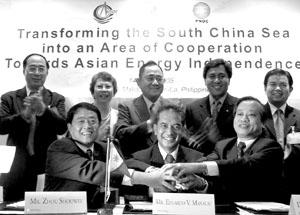



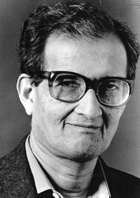


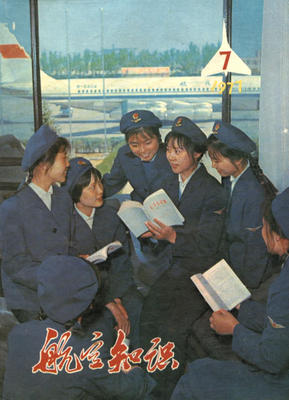
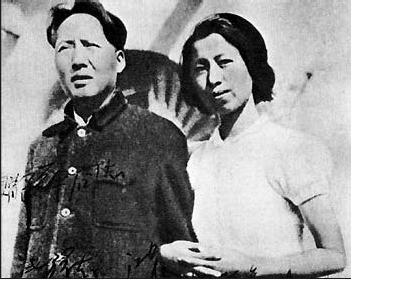
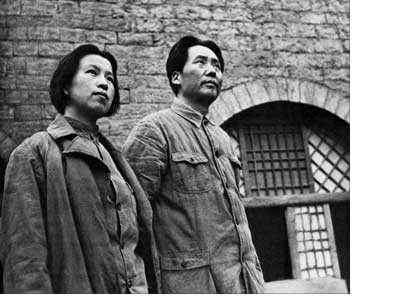

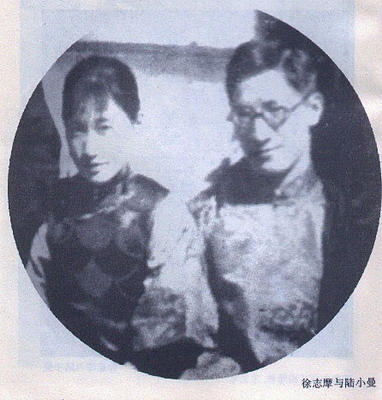 Two young Princesses in the scence: the daughter of Chairman Mao: Li Na (left 1) and the daughter of vice Chairman Lin: Lin Doudou (right 2). The rightest one is the evil: Ye Qun!
Two young Princesses in the scence: the daughter of Chairman Mao: Li Na (left 1) and the daughter of vice Chairman Lin: Lin Doudou (right 2). The rightest one is the evil: Ye Qun!


